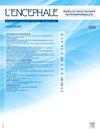法国封闭式教育中心的精神障碍发病率。
IF 1
4区 医学
Q4 NEUROSCIENCES
Encephale-Revue De Psychiatrie Clinique Biologique et Therapeutique
Pub Date : 2025-02-01
DOI:10.1016/j.encep.2023.11.026
引用次数: 0
摘要
介绍:封闭式教育中心(CEC)接收的青少年罪犯大多患有行为障碍(CD)。除行为障碍外,精神障碍也是影响教育行动效果的不利因素。此外,不良的生活经历也是这一人群中经常出现的脆弱因素。本文旨在记录被安置在儿童早期教育中心的青少年中精神障碍、遭受创伤和心理行为特征之间的流行程度和联系:我们对被安置在法国九个封闭式教育中心的101名青少年样本进行了一项多中心流行病学研究。精神障碍通过MINI-KID 2和康纳斯评定量表问卷进行测量。研究还使用了几份问卷来收集每个青少年的社会人口学数据和心理状况:结果:90.2%的青少年至少患有一种精神障碍,其中以行为障碍为主(80%)。同时还经常发现合并症:在患有行为障碍的受试者中,37%至少患有一种其他精神障碍。有趣的是,行为障碍的严重程度与童年不良经历(ACE)得分有显著的相关性。此外,研究还发现了两个亚组:患有单独行为障碍的青少年(44.6%)和患有其他精神障碍(45.7%)并伴有或不伴有行为障碍的青少年。后者在依恋模式、被遗弃感、敌意和冲动方面表现出较高的脆弱性和较差的结果:这项研究是法国第一项针对少年犯精神障碍的流行病学研究。该研究表明,发现 CEC 中青少年的精神障碍是根据不同情况实施有针对性干预的重要前提。此外,医学、心理学和司法领域之间必须以业务伙伴关系的形式开展合作,以确保为这些青少年提供更好的支持。本文章由计算机程序翻译,如有差异,请以英文原文为准。
Prevalence of mental disorders in closed educational centers in France
Introduction
Closed educational centres (CEC) receive young offenders who most often have a conduct disorder (CD). Mental disorders other than conduct disorder are a negative factor in the effect of educational actions. Moreover, adverse life experiences are frequent vulnerability factors in this population. This article aims to document the prevalence and links between psychiatric disorders, exposure to trauma, and the psycho-behavioural characteristics of adolescents placed in CEC.
Method
We conducted a multicentre epidemiological study on a sample of 101 adolescents placed in nine closed educational centres in France. Psychiatric disorders were measured by the MINI-KID 2 and Conners Rating Scale questionnaires. Several questionnaires were used to collect sociodemographic data and the psychological profile of each adolescent.
Results
Among the adolescents, 90.2% had at least one mental disorder with a predominance of conduct disorder (80%). Comorbidity was also frequently found: among the subjects with conduct disorder, 37% had at least one other psychiatric disorder. Interestingly, the intensity of conduct disorder and the Adverse Childhood Experiences (ACE) score were significantly correlated. Furthermore, two subgroups were identified: adolescents with isolated conduct disorder (44.6%) and adolescents with other psychiatric disorders (45.7%) with or without conduct disorder. The latter subgroup showed higher vulnerability and poorer outcomes in terms of attachment patterns, feelings of abandonment, hostility and impulsivity.
Conclusion
This study is the first French epidemiological study of mental disorders in juvenile offenders. It suggests that the detection of psychiatric disorders in young people in CEC is an important prerequisite for the implementation of targeted interventions according to different profiles. Furthermore, collaboration between the medical-psychological and judicial fields, in the form of an operational partnership, is necessary to guarantee better support for these young people.
求助全文
通过发布文献求助,成功后即可免费获取论文全文。
去求助
来源期刊
CiteScore
4.60
自引率
7.40%
发文量
162
审稿时长
6-12 weeks
期刊介绍:
Une revue française de renommée internationale.
- Un comite de rédaction représentant tous les aspects de la prise en charge psychiatrique du patient.
- Une sélection rigoureuse d''articles faisant l''objet de plusieurs expertises.
- Des travaux d''auteurs et de chercheurs de renommée internationale.
- Des indexations dans les grandes bases de données (Current Contents, Excerpta Medica, etc.).
- Un facteur d''impact qui témoigne de la grande notoriété de la revue.
La tribune des publications originales de haut niveau.
- Une très grande diversité des sujets traités, rigoureusement sélectionnés à travers des sommaires dynamiques :
- des éditoriaux de médecins référents,
- une revue de presse sur les actualités internationales,
- des articles originaux pour approfondir vos connaissances,
- des mises au point et des cas cliniques pour engager votre réflexion sur les indications et choix possibles au travers de mises en situation clinique,
- des dossiers thématiques pour faire le tour d''une question.
- L''actualité de l''AFPB : L''Encéphale publie régulièrement des comptes rendus de l''Association française de psychiatrie clinique.

 求助内容:
求助内容: 应助结果提醒方式:
应助结果提醒方式:


